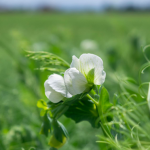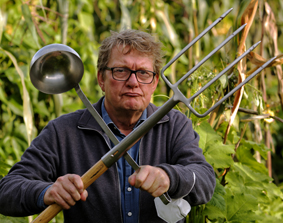As we watch the horrific war in Ukraine in disbelief and helplessness, the next global catastrophe is looming: Exploding energy and commodity prices meet reduced production of wheat, corn and oil crops. This could lead to a global, regionally catastrophic food crisis.
The fact that energy and food prices have been moving virtually in parallel for decades is one of the scourges of sustainable global hunger relief. After a decade of relative calm in the commodity market, this could lead to hunger and price explosions for bread this year. The ingredients of the “perfect storm” that is emerging also include the multiplication of prices for artificial nitrogen fertilizer, whose most important ingredient is gas, as well as the expansion of biogas and biofuel now being called for again as an alternative to Putin’s gas and oil, despite its proven harmfulness to the climate.

Rollback with the help of Putin?
In an almost uncontrolled outburst of resentment against the “whole eco-thing,” agricultural functionaries and their partisans are demanding, among other things, additional subsidies for fertilizer and diesel, the rollback of environmental measures and a restriction of organic farming. The EU’s Farm to Fork strategy, the climate adaptation of industrial agriculture, the damned fertilizer regulation, the EU’s currently pending entry into the phase-out of pesticides, the compromises of the Commission on the Future of Agriculture, the recommendations for the restructuring of animal husbandry, all of this, so some eternal diehards hope, could now simply be wiped off the table again thanks to Putin’s war, or at least postponed to never-never days. This is somewhat reminiscent of those Mercedes drivers who try to cheat their way through the emergency lane behind the ambulance.
What this narrative tends to gloss over: Less than 50% of the world’s grain harvest is still used as food. Even a moderate reallocation could therefore prevent impending hunger. Increasing production at any ecological and political price is neither sensible nor necessary.
What is needed now is an accelerated and substantial reduction in the consumption of grain in the meat industry and agricultural energy in favor of the production of food; not only for their own, already oversaturated needs, but above all for those of Cairo, Beirut and many import-dependent metropolitan areas and countries in the South.

Weizen als Waffe?
Hunger and bread as a weapon in the new global confrontation? The EU and especially the G7 as the main exporting countries can prevent this. To do so they may have to resort to direct intervention in the short term, including the mobilization of reserves to bridge the gap until the next harvest. The problem is not an absolute shortage of wheat. But the uncontrolled price, the “free” competition between tank, trough and plate on the world market and the speculation with it can mean the difference between poverty and misery, between minimum supply and threatening malnutrition for tens of millions of families.
For a large part of the more than 800 million hungry people in the world who have become victims of civil wars, displacement and persecution in the rural areas, world market prices are decisive only if they affect the ability of the UN’s World Food Program to purchase sufficient quantities for emergency aid. But for all those in the slums and working-class neighborhoods of southern megacities whose meager incomes barely provide enough to feed their families, the swings on the wheat exchanges of Chicago and Paris are decisive. The social, political and migratory explosive power of the fatal link between energy and food prices was demonstrated by the crises of 2008 and 2011.
This year will show whether both importing and exporting countries have really learned from this experience, and also what role the Food and Agriculture Organization (FAO) under the new Chinese leadership will play in this. The World Food Program has been one of Ukraine’s best customers so far.
The possible loss of Ukrainian exports must by no means lead to an additional dependence on Russian grain for import-dependent nations in the Middle East, first and foremost Egypt, but also Indonesia, Turkey, Algeria, the Philippines and Bangladesh! The USA, Canada, Australia and the EU can prevent this by jointly controlling the automaticity of their own markets.
The acid test for food and agricultural transformation
If Germany, together with France, were to properly assume the leading role within the EU and the presidency of the G7, the democratic community of values, which has become stronger in the face of barbarism, could prove that it finally also respects the right to sufficient and healthy food as an essential human right and the foundation of democratic self-determination and is prepared to defend it globally. On the other hand, there is no such thing as a human right to steaks at knock-down prices and biodiesel nor to the export of pig’s ears to the Chinese market, fertilized with Russian gas and fattened with feed wheat, regardless of where the price of bread in Cairo stands as a result.
Both the fight against hunger and the sustainable transformation of food and agriculture in Europe are coming to a head much faster than some had expected as a result of this horrific war. Important decisions will already be made in the next few weeks when it comes to sowing. How will it be feasible and turn out in Ukraine, how in Russia? How will agriculture in the EU react? Will it increase its food cultivation at the expense of cheap agricultural raw materials or will it go into a martial production battle to save the industrial agricultural mania? Will it do more of the wrong thing or do the right thing faster?
In Germany, it remains to be seen whether the commitments made by its “Commission on the Future of Agriculture” in a compromise between the farmers’ association and environmental protection organizations were lip service or are now actually proving their value as the basis for accelerated restructuring. Ag minister Cem Özdemir found the right words in recent days. Now a broad alliance of environmental, consumer, farmer and other associations and organizations must resolutely strengthen his position.
Aktion Agrar has started a first signature campaign on this topic. More hopefully following soon. We will keep you up to date.
Proposals and questions from our EU agricultural think tank ARC2020 (in English)




